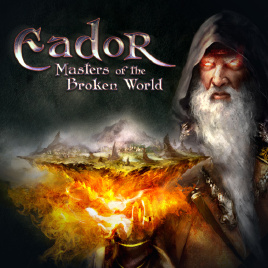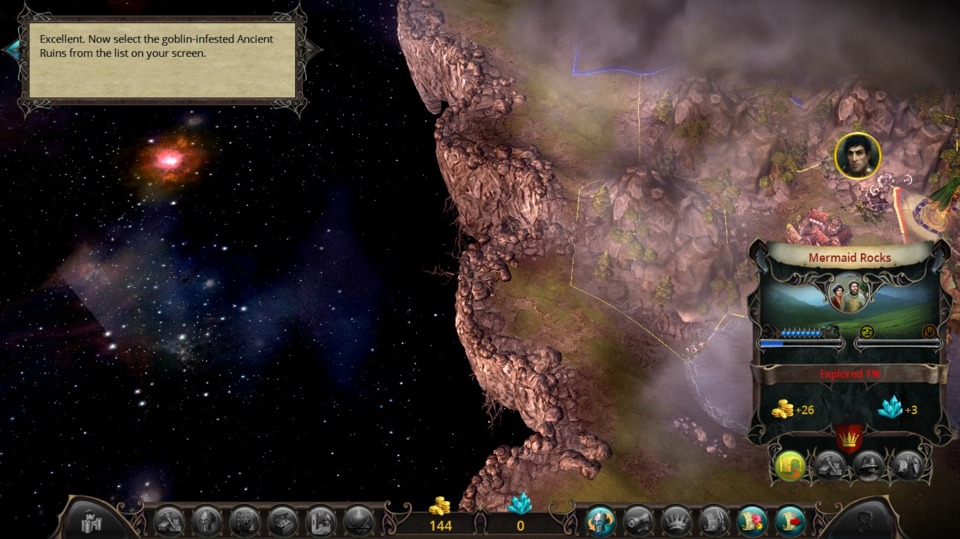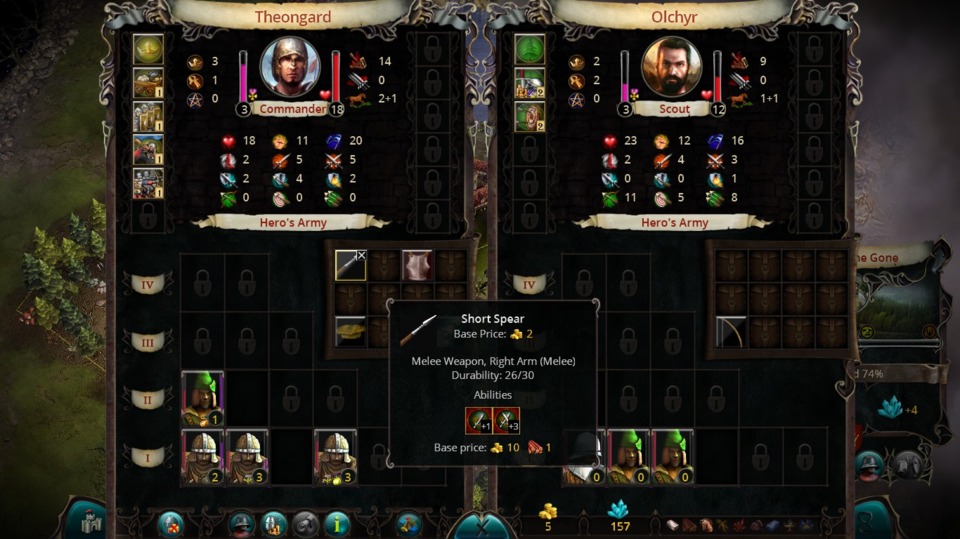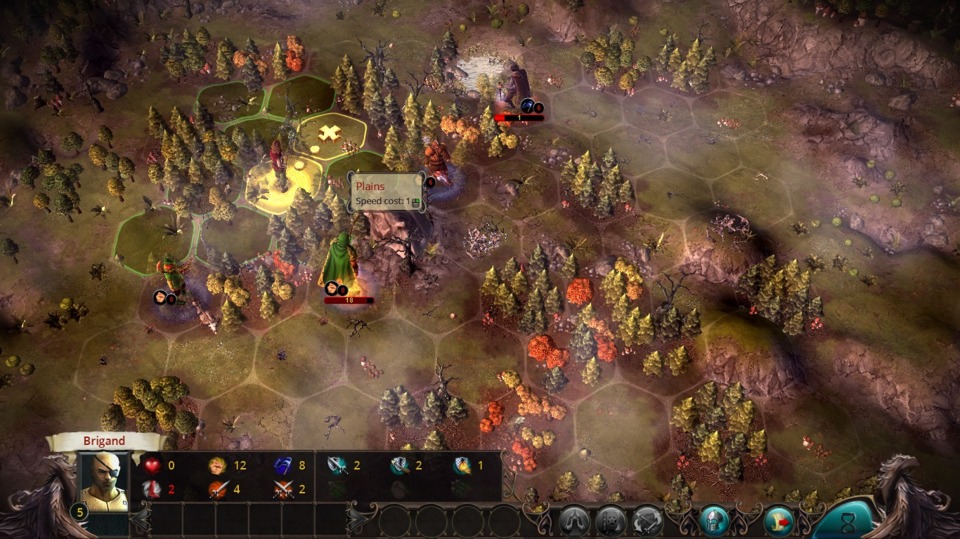Mento's May Madness Melange: #1C - Master (of Magic) Blasters
By Mento 10 Comments
(This is Part Three of a three-part opening salvo for 2014's May Madness Melange. If you're looking for Part One, try here. If you found this page looking for cute videos of kittens or your email, I don't know what to tell you. Blame Google?)
Finally, we now move onto our third game, bringing this special feature to a close. Once again, let's bring up the big ol' list of Master of Magic facets that we'll be using to judge this new game worthiness. A more elaborate breakdown can be found in Part One of this three-part mini-series. Of a much larger series. That is itself a sequel to a bunch of other blog features. I'm sure you're all glad I make these things easy for everyone to follow.
- Spells, and lots of 'em.
- A set-piece tactical combat system with strategy n' shit.
- Ruins and dungeons to explore.
- Hero and army customization.
- An extensive city building system, that allows for various different types of city layout depending on its location and resources.
- An array of races and magic disciplines to invest in.
- That wonderful feeling of late-game invincibility, usually the result of breaking the game in some way by gaining too much power.
- I didn't find it boring.
What's beyond door number three...?
Eador: Masters of the Broken World

The Russia-based Snowbird Game Studios's Eador: Masters of the Broken World is an unusual idea for a fantasy strategy game, and its conceit is a little closer to the obscure-ish 16-bit god sim Mega-lo-Mania than to Master of Magic. Instead of a single world to conquer, there are several floating around as independent entities in a large cosmos-like ether that you take over independently from whichever Lords are currently inhabiting them. It's a little more RPG focused, but still retains a lot of city-building elements. It also very much drinks deeply from the Master of Magic well, with many allusions and systems borrowed from my favorite PC game. I didn't play its immediate precursor, Eador: Genesis, but it looks as if Masters of the Broken World is a better realized version of that original.

In Eador: Masters of the Broken World the player is some manner of sentient ethereal being that is able to inhabit and take command of mortals. His task is to bring together the shattered world of Eador, currently a plethora of disjointed rocks floating in an astral cosmos, by jumping into each "shard" and removing all opposition to your rule. In doing so, the player discovers new technologies and concepts that can be carried over to the next playthrough (though nothing else seems to transfer, like heroes or existing inventories), such as new troop types, new building blueprints and new spells.
Master of Master of Magic?
- Eador's got quite the multitude of spells, but access to them is limited. The player must construct buildings in their stronghold (the only truly customizable city in each scenario and the hub of their empire) that provide the use of magic, and then their heroes are able to cast them in the field similarly to those of Heroes of Might and Magic. The player also has global "rituals", which provide a boon to any hero on the map for a few resources but also require cooldown periods before they can be used again. There's also one-off spells that can be used from scrolls that a hero might come across while looting. There's no big emphasis on magic, unless the character has a mage hero, but it's there.
- Eador's combat is pretty involved. There's topography to consider, with benefits gained from high ground and dense cover, and the two sides can have more than a dozen units each. They don't stack, fortunately, but there's still the potential for pretty big skirmishes. While it's definitely glitchy in parts, it's quite substantial and enjoyably dense. (Just like me? Oof. I oughta curb this self-effacement a little.)
- Where Eador perhaps shines the most, even in comparison to Master of Magic, is how every province in the game has a huge amount of unexplored content that you can set a hero on checking out in lieu of doing anything more important. Each turn while exploring, the player might find a new dungeon with its own assortment of defenders and treasures, or activate a random event that might help or hinder the player's side. It feels like you could spend hours just exploring each square, hoping to come across something lucrative and intriguing. It's worth noting that due to the game's severe difficulty, even on the easiest setting, most dungeons aren't worth the trouble unless you get a good scout report and an even better army of units on your side.
- Eador's hero customization is extensive, almost to the extent of an actual RPG. There's a lot of equipment slots from armor and multiple weapons to those for individual belts, cloaks and rings. Each hero has a basic focus, whether they're a scout or a commander or a wizard, but (as with Disciples II) each level up brings a new decision for how to advance the character. A scout, for instance, can focus on combat aspects like the power and capacity of their bow and arrows or their ability to dodge blows, or they can focus on non-combat skills such as increasing their loot intake, the speed at which they explore a province or their diplomacy with NPCs. Likewise, each unit levels up and has a few options to level up their various stats, and occasionally acquire special class skills or even earn medals that boost their stats at the cost of a slightly higher per-turn upkeep.
- Though the game only lets you develop one city per shard, the sheer number of different buildings and upgrades you can construct is enough to make one's head swim. And this isn't even considering the number of extra structure blueprints one might earn as rewards for completing other scenarios. It can be prohibitively expensive early on, but ensuring there's many unit training buildings and various population and unrest controlling fixtures is vital for the success of the scenario.
- I didn't see too many playable races, but it seems like there's various dwarven, elven and goblinkin settlements with their own types of troops and abilities. It's possible future scenarios will allow you to play as one of them instead, but I cannot say for certain. There's no limitations on magic disciplines: all types of spell seem to be available eventually, though as I said earlier they require a bit of work before they can be accessed.
- As for the invulnerability feeling, well... I'll go into more detail in the Additional Info section below. Suffice it to say, this is the part where the game kind of falls apart a little. You'll see what I mean.
- Honestly, it's not a boring game. It has everything I want from a Master of Magic-inspired fantasy strategy sim. At this point, though, I'm strongly considering adding a few cheats to make it at least a little less brutal. It's also highly possible that by taking one's time and simply taking the critical path through most of these nodes, rather than trying to explore dungeons and fight optional areas that are simply way too difficult, I might earn a few crucial upgrades and make the rest of the game easier. Somehow I doubt it though. For the time being, I'll just mourn getting so close but not quite finding what I was looking for, like a dimension where everything's normal except for the fact that everyone eats food with long lizard tongues.

Additional Info
Now, so far, Eador is everything I ever wanted out of a modern Master of Magic. It doubles down on the fun RPG stuff, while still allowing for a considerable amount of warmongering and city building. Running around, searching for new dungeons to plunder, with gold, equipment and powerful artifacts lying around to acquire for my war coffers is pretty much my favorite part of Master of Magic. However, much like those Earth-like planets in Mass Effect that produce too much toxic pollen for human habitation, there's something that's just not quite perfect about this game. Specifically, its obscenely high level of difficulty. Even on its easiest difficulty setting, you'd be lucky to walk away from any battle where the game didn't assure you beforehand that victory was certain (and even with that assurance, I've gotten wiped out a few times). Troops are expensive, don't ever seem to heal between fights without hiring a healer at cost to do it manually in combat, and units grow increasingly more ineffective the more they're injured. Then there are the random events with multiple choice outcomes, which are so indescribably unfair that I'm having to break from this format briefly to present a hypothetical example of the shit I'm having to put up with:
You encounter a small puppy on the side of the road during your travels. It looks up at you with a friendly and guileless smile, its tail wagging.
> 1. Murder it in cold blood as various children from the local village look on in horror.
> 2. Ignore it. Ignore everything. If we ignore it maybe it won't hurt us this time.
> 3. Pet the cute puppy.
So let's explore our options here:
- The village children tell their elders of the horrible puppy-murdering tyrant that even now bears down on their tiny hamlet. Their disposition towards you plummets, making it extremely difficult to negotiate with the village mayor for their allegiance. Eventually, you're forced to murder a whole horde of torch-wielding villagers, taking several casualties of your own. Though you capture the province, the villagers continue to despise you and revolt the first opportunity they get. A nearby orc battalion marches in while the village people are distracted burning familiar-looking effigies, giving the nearby Orc Empire close access to your capital city.
- You ignore the puppy. The puppy then transforms into Gamblor, the God of Fortune, and sadly ascends back to his astral home rather than granting the party an obscenely powerful artifact for what it assumed would be their good natured happy-go-lucky approach to life. Instead, it believes the player's empire is too dour and decides to make life more fun for them by transforming all the gold in the treasury into chocolate coins.
- The puppy bites the player's hero hard on his hand as he reaches down to pet it, infecting him with a particularly virulent strain of rabies that soon spreads to the rest of his army, the province, the stronghold, the shard and, inevitably, the rest of the universe. There are no survivors. No survivors, that is, but for the puppy who is currently busy trying to chase a butterfly around a meadow filled with bodies. It trips over a bone cropping out of the ground, tumbling head over heels in such an adorable fashion that, had there been anyone left alive to witness it, they'd be all like "aww, shit's cute".
Grousing about a game's difficulty is one thing, but a lot of the time it feels as if the game is deliberately stacking the odds against me for no appreciable reason. I don't mind a challenge (I'd prefer an easier time of it initially though at least, if only to get my bearings) but there's a point where a game crosses over from challenging to obnoxiously, aggressively punishing. Punishing isn't fun. In fact, it's the antonym for fun. But as this is the only point against it in my eyes, I'm not even sure how I'm feeling about this game as a result. It's like the core is busted but everything around it is just peaches and gravy. Or... wait, what?

Anyway, I played through the relatively brief tutorial, and then about 25 turns into a new scenario on a "tiny" sized shard. I've got plenty left to do here, should I want to keep pressing my luck with some of these dungeons, or I can try and make for the opposing warlord's stronghold and hope I can overpower them. I suppose I could also hire a new hero, but my cash supply is always on the cusp of running out entirely and raiding dungeons is all I can really do to keep me in the black. The game is at least generous with the auto-saves, letting you roll back to up to five turns ago. You also can't lose any heroes, though it costs a lot to resurrect them. Though I speak of harshness, it's worth keeping in perspective the number of outs it affords you in case you screw up, and most of the harder challenges I've faced were entirely of my own volition (though honestly, I didn't expect to get wiped out by a fairy glade after my hero proudly boasted he could put the whole enchanted forest to the torch with few casualties. Funny how a pegasus that can fly right across the map and kill all my archers and healers had a different opinion on the outcome).
